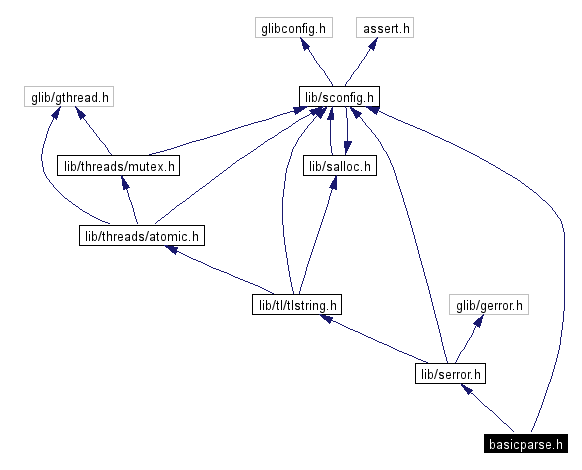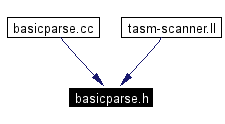
#include <lib/sconfig.h>
#include <lib/serror.h>
Include dependency graph for basicparse.h:

This graph shows which files directly or indirectly include this file:

Go to the source code of this file.
Defines | |
| #define | _LIB_LEX_BASICPARSE_H_ 1 |
Functions | |
| char * | ParseInt (int32 *val, const char *str, SError &error, bool may_continue=0) |
| Read in a signed 32bit integer value. | |
| char * | ParseInt (int8 *val, const char *str, SError &error, bool may_continue=0) |
| Read in a signed 8bit integer value. | |
| char * | ParseInt (int16 *val, const char *str, SError &error, bool may_continue=0) |
| Read in a signed 16bit integer value. | |
| char * | ParseInt (int64 *val, const char *str, SError &error, bool may_continue=0) |
| Read in a signed 64bit integer value. | |
| char * | ParseInt (uint32 *val, const char *str, SError &error, bool may_continue=0) |
| Read in an unsigned 32bit integer value. | |
| char * | ParseInt (uint8 *val, const char *str, SError &error, bool may_continue=0) |
| Read in an unsigned 8bit integer value. | |
| char * | ParseInt (uint16 *val, const char *str, SError &error, bool may_continue=0) |
| Read in an unsigned 16bit integer value. | |
| char * | ParseInt (uint64 *val, const char *str, SError &error, bool may_continue=0) |
| Read in an unsigned 64bit integer value. | |
| char * | ParseFloat (dbl *val, const char *str, SError &error, bool may_continue=0) |
| Read in a dbl (double) floating point value. | |
| char * | ParseFloat (flt *val, const char *str, SError &error, bool may_continue=0) |
| Read in an flt (float) floating point value. | |
Definition in file basicparse.h.
|
|
Definition at line 18 of file basicparse.h. |
|
||||||||||||||||||||
|
Read in an flt (float) floating point value.
Definition at line 325 of file basicparse.cc. References flt. Referenced by ParseFloatSpec(). |
|
||||||||||||||||||||
|
Read in a dbl (double) floating point value.
The input is a NUL-terminated string in str. The parsed float is stored in *val (overloaded allowing the compiler to select the correct version itself). Errors: Out of range or (in case may_continue is not set) if not the whole input was a valid floating point value.
Definition at line 327 of file basicparse.cc. References dbl. |
|
||||||||||||||||||||
|
Read in an unsigned 64bit integer value.
Definition at line 290 of file basicparse.cc. References uint64. |
|
||||||||||||||||||||
|
Read in an unsigned 16bit integer value.
Definition at line 284 of file basicparse.cc. References uint16. |
|
||||||||||||||||||||
|
Read in an unsigned 8bit integer value.
Definition at line 281 of file basicparse.cc. References uint8. |
|
||||||||||||||||||||
|
Read in an unsigned 32bit integer value.
For more information, see ParseInt() for signed 32bit integers. Definition at line 287 of file basicparse.cc. References uint32. |
|
||||||||||||||||||||
|
Read in a signed 64bit integer value.
Definition at line 165 of file basicparse.cc. References int64. |
|
||||||||||||||||||||
|
Read in a signed 16bit integer value.
Definition at line 159 of file basicparse.cc. References int16. |
|
||||||||||||||||||||
|
Read in a signed 8bit integer value.
Definition at line 156 of file basicparse.cc. References int8. |
|
||||||||||||||||||||
|
Read in a signed 32bit integer value.
The passed string is a standard NUL-terminated string. The parsing is done as follows:
In case an over/underflow occurs, the largest/smallest value representable by the type is returned and the overflow error is set in the passed SError. Definition at line 162 of file basicparse.cc. References int32. |
 1.3.5
1.3.5